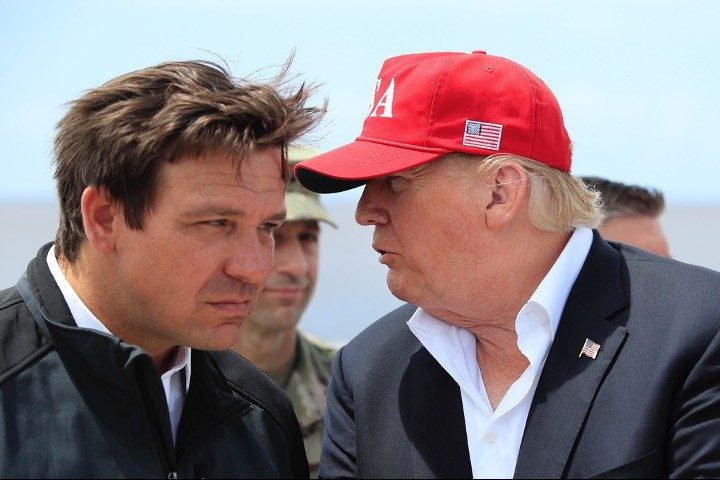
As the contest to determine who will be at the top of the Republican ticket in 2024 heats up, it’s illuminating to see who’s lining up behind whom and where the donor class is placing their money.
The difference in support bases is illustrated by the “clash” between two high-profile GOP events taking place this weekend.
The yearly Conservative Political Action Conference (CPAC) in Washington, D.C., is being headlined by President Donald Trump this year.
Governor Ron DeSantis, who has not officially announced his candidacy but who is widely believed to be gearing up for a run, will not be at CPAC as in years past, but will instead be at a Palm Beach retreat for the prestigious big-money group Club for Growth — a retreat to which Trump, notably, was not invited.
With a few exceptions, there’s little overlap between the speakers at the two events. Besides DeSantis, the Club for Growth retreat will feature former Vice President Mike Pence, Senator Tim Scott and New Hampshire Governor Chris Sununu — all of whom have indicated they may step in the 2024 ring
Senators Ted Cruz (R-Texas) and Rick Scott (R-Fla.) will also be in Palm Beach, but have not expressed an interest in seeking the nomination this time around.
Besides Trump, CPAC, known as one of the most prominent gatherings of big names in conservative politics in America, will also feature former Secretary of State Mike Pompeo and Virginia Governor Glenn Youngkin — both of whom were also invited to the Club for Growth fundraiser but said they could not make it due to scheduling conflicts.
Meanwhile, former UN Ambassador Nikki Haley and biotech entrepreneur Vivek Ramaswamy (the two Republicans besides Trump to officially be in the race so far) will be at both events.
Club for Growth has made clear that it wants the Republican Party to move beyond Trump. Another big Republican donor network, the Koch Brothers’ Americans for Prosperity, has said the same. Both groups have signaled that they are willing to get directly involved in the 2024 primary race by paying for advertising on behalf of their preferred candidates — which will clearly not be Trump.
Trump, in response to Club for Growth’s position, called the organization “Club For NO Growth.”
As Politico notes of Club for Growth’s break with Trump:
The Club and its president, David McIntosh, have endured a tumultuous relationship with the former president, first opposing him in 2016 before embracing Trump as an ally in the years to follow. McIntosh influenced some of Trump’s high-profile endorsements in the 2022 midterms, though the two men clashed over contentious Senate primaries in Ohio, Pennsylvania and Alabama.
… Club for Growth donated last year to DeSantis’ reelection bid, as well as to a super PAC supporting Tim Scott, another potential Trump rival in a 2024 Republican presidential primary.
Several individual Republican megadonors have said they’re looking to put their cash behind someone other than the 45th president.
For many such members of the political establishment, the choice is DeSantis.
Over the weekend, a number of longtime Trump allies joined DeSantis at an event he held in Palm Beach celebrating the “Florida Blueprint.”
Attendees included Wisconsin Senator Ron Johnson; Arizona Republican Jim Lamon, a solar-energy executive and Trump donor; Arkansas Senator Tom Cotton; Roy Bailey, a well-known Texas fundraiser who helped steer the Trump campaign’s finance committee; and Mick Mulvaney, who served as Trump’s acting chief of staff in the White House.
DeSantis has continued to raise his national profile through various political moves in Florida touching upon issues that have long been of importance to the GOP base.
For example, the governor is pushing the GOP-dominated Legislature to pass a bill that would strip away liability protections that journalists have long enjoyed — a proposal that has the mainstream media on edge.
Republicans’ plan would make it easier to bring defamation lawsuits against the media. It would also lay the groundwork for a legal battle with the hope of eventually having the Supreme Court repeal New York Times v. Sullivan, the 1964 SCOTUS ruling that restricts the ability of public officials to sue publishers for defamation.
“The idea that they would create narratives that are contrary to discovering facts, I don’t know that was the standard,” the governor said at a February roundtable at which he, along with right-wing personalities, lawyers, and media experts, spoke of the media’s partisan track record.
“Now it seems you pursue the narrative, you’re trying to advance the narrative and trying to get the clicks, and the fact-checking and contrary facts have just fallen by the wayside,” DeSantis added.
He also recently unveiled a hardline immigration plan that would increase human smuggling penalties, impose mandatory E-Verify, and ban counties from giving driver’s licenses to illegal aliens, among other measures.
It once appeared that Trump had a clear path to victory in any Republican primary in which he chose to run. Now, however, the Trump-DeSantis divide has made it anyone’s guess as to who will be the party’s candidate come next year.




